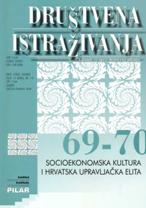Nestajanje rada? Opseg i oblici zaposlenosti na početku informacijskoga doba
Disappearance of Work? The Scope and Forms of Employment at the Dawn of the Information Age
Author(s): Teo MatkovićSubject(s): Social Sciences
Published by: Institut društvenih znanosti Ivo Pilar
Keywords: employment; flexibility; informatisation; transition countries; work
Summary/Abstract: Work is a social construct – one that performs a socially identified and normalized function in the (re)production of the social whole. Despite the fear of the disappearance of work due to informatisation, on the global level the number of jobs is growing. However, in the break with the recent industrial past, there has been a (re)emergence of contingent forms of employment on the labour market. Central to them is the doctrine of flexibility – which impacts on time, place, stability and the social contract under which work takes place. Within the new division of labour, in economies where creativity, information processing and in-person services are considered the main source of growth, work based on the analysis of symbols and emotional labour is ever gaining in im-portance. Comparative analysis of the scope and forms of employment, mostly based on Labour Force Survey data, led to the following conclusions. In the first world countries there is a gene-ral increase in the employment level, accompanied by a moderate rise in nonstandard forms of employment. In the transition countries, the chain of crises and shrinking of labour markets led to an increase of nonstandard forms of employment, accompanied by a decrease in total employment. Croatia followed a similar pattern. After a long period of politically sponsored growth, since 1990 there has been a steady decline in the numbers of employed and activity rates, as well as an increase in unemployment rate. During that period, work in non-formal economy, self-employment and temporary and fixed-time contracts have become more common. Such developments may lead to the disappearance of human rights through the transformation of work, exclusion of large parts of the population, and separation of the economy from society. But new production forces also provide possibility for the improvement of the world of work, and for the implementation of the multi-activity concept.
Journal: Društvena istraživanja - Časopis za opća društvena pitanja
- Issue Year: 13/2004
- Issue No: 69+70
- Page Range: 241-265
- Page Count: 25
- Language: Croatian

